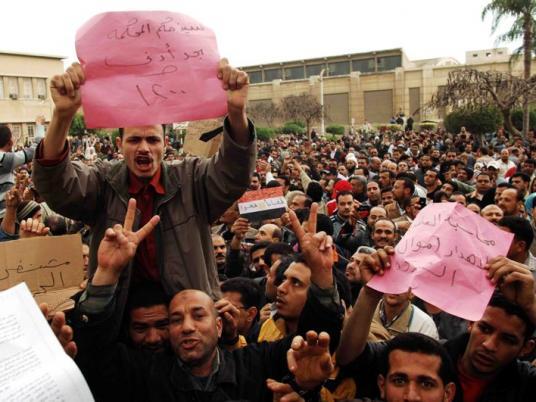CAIRO: Eight whole years after the Doctors’ Syndicate first proposed a draft law to regulate organ transplants, the Egyptian parliament has finally signed off on the controversial law much to the relief of thousands of desperate patients – but will the new law succeed in ending organ trafficking?
The absence of appropriate legislation has over the years, given rise to a thriving illegal organ trade business in Egypt, where, according to the World Health Organization, commercial living donors, mainly the poor and vulnerable, are thought to supply 10 percent of the world’s kidneys, at an estimated price of $1,700-$2,700 per kidney.
Hundreds of victims of organ theft as well as voluntary donors, whose dire financial situation left them with no alternative but to sell a kidney or a portion of their liver, have reportedly regretted their decision. The WHO also states that four out of five such cases complain of worsening health after the operation and that on average, the money they earn in the transaction is all spent within five months.
The long overdue law had been collecting dust as legislators engaged in tortuous, Byzantine debates over the definition of death, when the whole world (including Muslim countries like the ultra-conservative Saudi Arabia) had instated mechanisms to regulate the transfer of organs from deceased donors.
Disagreeing with the medical definition that brain death constitutes final death, Egyptian MPs argued that the arrest of both the brain and the heart are necessary to declare a person dead and hence allow the removal of their organs. Other debates involved convoluted pseudo-theological ideas about whether any person has the religious right to give away part of their body, which in itself, is a gift from God, and to whom it shall return.
Strangely, these arguments persisted even after Grand Sheikh of Al-Azhar Mohamed Sayed Tantawy, as far back as 1997, issued a fatwa allowing organ transplants, and vowing to donate his own organs after death.
To circumvent these labyrinthine ideological skirmishes, the PA committees which approved the new law, decided that the legislation would refrain from defining death altogether. Instead, debatable cases of organ donation from deceased persons will be referred to a panel of three experts, who must reach consensus on whether or not the donor is dead. The Higher Committee for Organ Transplants would appoint the experts in conjunction with the Ministry of Health.
According to the draft law, the removal of organs for transplant procedures before the panel’s approval would be considered first-degree murder and punishable by death. The law also stipulates that organ donations from live donors will be restricted to family members of the fourth degree, again in a bid to end the illegal trade.
In order to ensure a measure of equity, transplants for low-income patients will be financed by the state, whereby the health ministry will conduct the surgery according to case urgency, with a specialized committee in place to decide on priority cases. A proper organ waiting list will be drafted with provisions that would seriously penalize anyone who tries to cheat his way into the list.
Doctors who perform illegal organ transplant procedures will be subjected to a maximum sentence of 15 years in jail, while hospitals and medical facilities allowing illegal operations will be fined up to LE 1 million and can be shut down altogether, as per the new law.
The new penalties are a far cry from the existing ones, where just a few days ago, a Agouza misdemeanors court – not a criminal court – sentenced a doctor to one year in jail and a LE 200 fine for negligence that led to the death of a 60-year-old following a kidney transplant procedure for which her son, who later pressed charges, paid $40,000 (roughly LE 220,000), according to Al-Gomhuria newspaper.
The police investigations proved that the now defunct Thebes International Hospital in Mohandiseen (one of Cairo’s upscale districts) was notorious for conducting illegal kidney transplants to the benefit of rich gulf Arabs who were made to pay up to LE 100,000 while the desperate donors were given LE 10,000 for their organs.
The incident highlights two major obstacles to the proper implementation of the new law: First, the absolute chaos marring the medical profession in Egypt at the moment – whether private or public – where a combination of legal loopholes, corruption and negligence conspire against all patients, rich or poor, practically rendering it impossible to hold doctors legally accountable for negligence in a court of law.
Secondly, there is the simple issue of supply and demand: As long as people continue to be destitute, unable to provide the basics of a dignified life for their families, they will continue to offer their organs to the highest bidder, and the criminals who mediate these inhumane transactions will always find a way, law or no law.
I am not saying that the new legislation is not a commendable milestone, but without proper implementation, nothing much will materially change in the current situation.
The next challenge will be to fine-tune the mechanisms related to convincing the broad public of the importance of donating their organs after death through nationwide awareness campaigns and a full-proof process that will immediately identify potential donors, on national ID cards, for instance.
The battle against organ trafficking is one that we cannot afford to lose, and as Egyptians, we are all foot soldiers in this fight for our collective dignity.
Rania Al Malky is the Chief Editor of Daily News Egypt.



